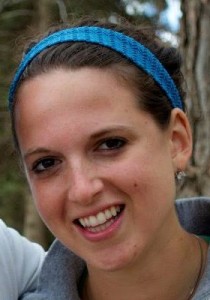Musings from Students of the Pardes Institute of Jewish Studies in Jerusalem
Posted on June 12, 2014 by Carolyn Gerecht
My dvar Torah from PCJE graduation:
 To commemorate the last day of our Gemara class this year with Rahel, we looked together at a special passage from Masechet Avoda Zara, Daf Yud Tet, Amud Alef. In the passage, Levi and Rabbi Shimon are studying together with Rah-bee. When they finish the text, Levi demands that next, they study Mishlay, Proverbs. Rabbi Shimon wants to study Tehillim, Psalms, and wins the argument. When they reach the line together in Tehillim, “Ki Matu Hacha Eem B’Torat Hashem Cheftzo,” “but his desire is in the Torah of Hashem,” Rah-bee enumerates the following: “Ein Adam Sheh Lomed Torah Eleh M’makom Sheh Libo Chafetz”: “One can only learn well from the part of Torah that fits his heart’s desire.” That’s not to mean: the parts of Torah that he likes the most, but rather, the parts that really speak to him. From this we see that different parts of Torah speak to each of us differently, and we each derive individual connections between texts, God, humanity, and ourselves. No two scholars are alike.
To commemorate the last day of our Gemara class this year with Rahel, we looked together at a special passage from Masechet Avoda Zara, Daf Yud Tet, Amud Alef. In the passage, Levi and Rabbi Shimon are studying together with Rah-bee. When they finish the text, Levi demands that next, they study Mishlay, Proverbs. Rabbi Shimon wants to study Tehillim, Psalms, and wins the argument. When they reach the line together in Tehillim, “Ki Matu Hacha Eem B’Torat Hashem Cheftzo,” “but his desire is in the Torah of Hashem,” Rah-bee enumerates the following: “Ein Adam Sheh Lomed Torah Eleh M’makom Sheh Libo Chafetz”: “One can only learn well from the part of Torah that fits his heart’s desire.” That’s not to mean: the parts of Torah that he likes the most, but rather, the parts that really speak to him. From this we see that different parts of Torah speak to each of us differently, and we each derive individual connections between texts, God, humanity, and ourselves. No two scholars are alike.
Two Jews, three opinions: diversity in the Jewish community may be perhaps our most notorious attribute; it is also a tool. One can only learn well the parts of Torah that fits his heart’s desire – in this, he finds his own truth. This multiplicity of interpretations and meanings keeps the Jewish community alive, it moves us forward, and so we embrace it.
In fact, God embraces it, too. In this week’s parsha, Parshat Beha’alotcha, we encounter two prophets, Eldad and May-dad, who, in Perek Yud Alef in Bamidbar, begin to prophesize from within the camp of Israelites, rather than leaving with Moshe and the rest of the elders to prophesy in the Tent of Meeting. When a youth runs and tattles on them, Yehoshua insists that Moshe rebuke them. Moshe replies, “Hamekanay atah li, umi yitein kol am hashem neviim ki yitein hashem et rucho aleihem?” “Are you jealous on my account? [Shouldn’t it be] that all God’s people are prophets, that God put His spirit upon all of them!” In this parsha, God speaks to prophets in the way that is right for them. And that’s okay. So too does God to speak to each of us uniquely.
But if it’s so important, how will each of us hear our message? Mordechai Kaplan, the founder of the Reconstructionist movement, whom I encountered this year in Modern Jewish Thought with Zvi Hirschfield, conceptualizes God as a Process, of hearing. For Kaplan, God does not dwell high in the sky but rather stirs inside each of us, helping us to find our place and guiding us from to do what’s right. This is how he conceives a higher power – as coming from within. And certainly, this kind of trust in God resonates with me. But, thankfully – we also have educators to light our way.
As educators, we must, in the words of Rav Nachman of Breslov, “Find the good in everyone, reveal it, and bring it forth.” Seek the message each individual has to share, and pull it out. Identify their strengths, and amplify them. What excites me about Jewish education is this kind of opportunity, to raise the confidence of others and use this energy to move the community forward. To expose new eyes to Jewish text, and create a kind of buoyancy that keeps our shared boat afloat.
As this year concludes, I am both grateful to those who brought forth the good in me, including Judy, Aviva, and Gail, and to my many teachers, family and friends. And also I am inspired to continue the task of helping others to discover: the good in themselves, the good in Torah, and the good in a vibrant Jewish life. Mazel tov to all who are graduating today!